What is counselling?
Counselling is a form of support which can be useful in many ways.
Counselling can support you to:
- Talk about your thoughts and feelings
- Gain awareness and understanding
- Work out what changes you could make
- Improve your overall health
- Raise your self-esteem and self-confidence
- Feel more positive about your future
- Get more from life

Finding the right person to talk to
Sometimes it can be hard to talk to people who are close to you. Maybe you feel embarrassed talking about some things to family and friends or your role has been to support them and you don’t feel you can burden them. Perhaps they feel they have to fix the problem for you. Or they don’t understand. Family and friends find it hard to be impartial.

A place to talk freely
For all of us, life is a series of ups and downs. Having someone there to listen to us and understand us during the ‘downs’ of life can help us to cope and find our way back up. By talking about how you feel and what difficulties you are struggling with, the counsellor will give you the time and space to explore your options and find your own solutions. Gaining awareness can help you feel more in control of your life. In this way you can begin to see life differently and feel at peace with yourself.
Counselling offers you a space to talk about things freely, in your own way, without judgement, and allows you to decide what, if anything, you wish to change.
I believe that you are the expert on your life. While I am trained to provide the optimum conditions for effective therapy, the counselling relationship is a collaborative process which can enable you to reach your full potential.

Confidential
All counselling is conducted in a confidential manner where nothing you say will be repeated outside the counselling room. There are, however, two exceptions to this. The first is in my regular meetings with a supervisor, which is a professional requirement. In supervision I talk about my work with clients in order for my supervisor to advise and challenge me on how I might give you the best in sessions. The second exception to confidentiality would only occur if I felt there was a genuine risk of harm to you or another person. In this scenario I would have an ethical duty to ensure everybody was safe, but I would always try to discuss my concerns with you first.
Get in touch
Whether you have previously tried counselling or are considering it now for the first time, we can meet for an initial session to see whether we feel we can work together well.